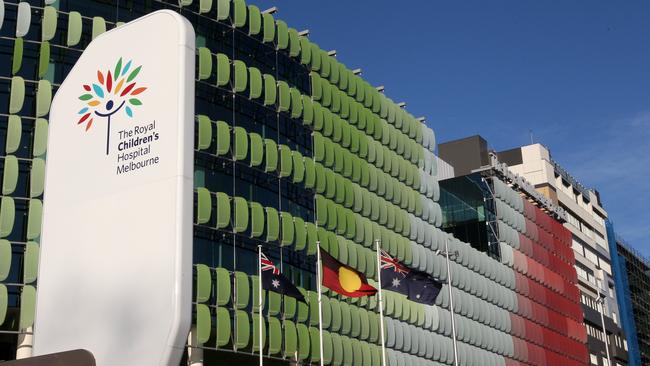Royal Children’s Hospital at breaking point as GP visits drop
EMERGENCY departments can’t keep up with an influx of sick kids, prompting secret calls to GP clinics to check if they’re turning away young patients.

VIC News
Don't miss out on the headlines from VIC News. Followed categories will be added to My News.
HOSPITAL emergency departments can’t keep up with an influx of sick children, prompting secret calls to GP clinics to check if they are turning away paediatric patients.
Emergencyvisits at the Royal Children’s Hospital have shot up by 10 per cent in the past year alone, prompting the RCH to urge families to visit a GP first, wherever possible, to avoid waits of up to six hours.
It has also begun an investigation into why families are not going to doctors’ clinics, and whether hospital specialists are having to treat chronically ill children because they have missed out on GP care.
The investigation, backed by the State Government and Northern Melbourne Medicare Local, has revealed a dramatic drop in GP consultations for children.
It also found more than twice the number of children aged up to five are attending Victorian emergency departments than any other age group.
The Herald Sun can reveal “secret shopper” calls are being made to GP clinics to uncover whether they are limiting appointments for children, whether parents are bypassing GPs and whether the fall in consultations is lowering paediatric treating skills.
Professor Gary Freed — who’s been brought out from the United States by the RCH and the University of Melbourne for a three-year investigation of Victoria’s paediatric emergency crush — said that the focus on an ageing population was squeezing out children.
Prof Freed has found that while there are 12 per cent more children han two decades ago, Medicare data show their number of GP visits has dropped — by more than 16 per cent for those under 5, and by almost 29 per cent for those up to 14 — owing to pressure on doctors to see older patients with chronic conditions.
“The issue of emergency department volume is very real and becoming increasingly critical,” Prof Freed said.
“We have more children in Australia today than we had 30 years ago and they need competent physicians as well who are trained in their care.
“It raises a red flag. We need to get a better understanding of the experience and competency of GP registrars nationwide with regard to the care of children.
“Today we have more children alive with chronic illness than we’ve ever had … because premature babies are saved, kids with heart disease are saved,” Prof Freed said.
The RCH is bearing the brunt of the pressure, but Prof Freed said paediatric presentations were growing at hospitals across the state.
Parents taking their children to the RCH, the Austin, and Northern and Sunshine hospitals are being quizzed to gain an insight into why they have gone to an emergency department and whether they had first tried other options, such as a GP or Nurse on Call.
GP clinics are also working with the researchers to gain a better idea of why hospitals are under increasing pressure.
Royal Australian College of General Practitioners president Dr Liz Marles said that while there were significant shortages of doctors in some areas, GPs did not discriminate between patients.
She said: “We would really encourage people to form a relationship with their GP, so they (the GPs) can actually get to know that family and the kids, understand the issues for that family, and give the parents a level of confidence about how they should manage the kids and when they should be calling the GP first and when it may be time to go to the ED.”
Dr Marles said: “The other access block can be that people can’t access a GP financially — and that is something which may get worse with the introduction of a co-payment.”
The state president of the Australian Medical Association, Tony Bartone, said the need for longer consultations to deal with an increasing number of patients suffering from chronic conditions meant that doctors had to be more focused and could see fewer patients overall.
“If people had a more regular relationship with their family doctor, a lot of this could be reduced in the long term,” Dr Bartone said.


